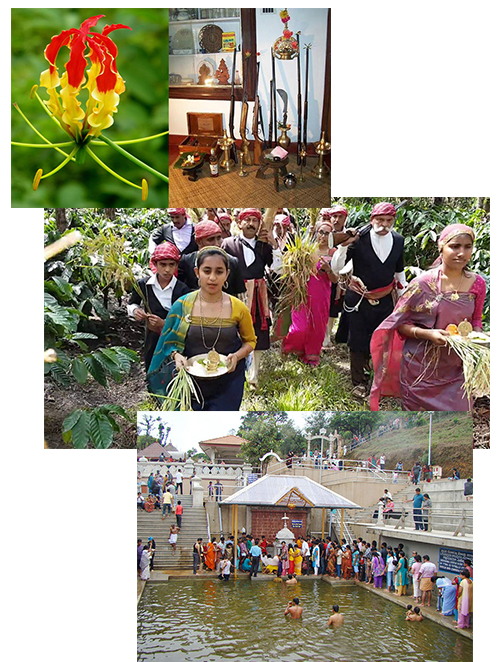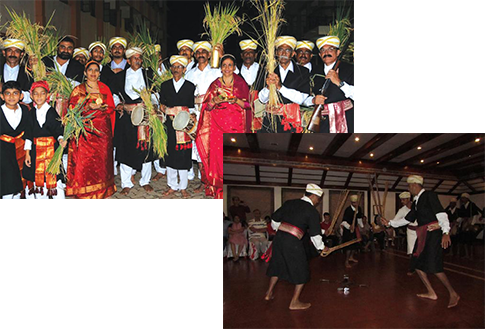CATEGORIES
Puthari - A festival where the Kodavas rejoice in the bounty of their land
by Sixth Element, on Nov 7th, 2019The land of Kodagu or Coorg is home to ‘the Kodavas’. Ethnically, the Kodavas have a distinct identity when compared to the other ethnic groups in India. At Sixth Element, you can learn more about this delightful community which prides itself for its distinctive tradition, culture and lifestyle. The language of Kodavas, for example, has evolved into something completely different than the languages spoken by people around them. The languages, like Kannada, Malayalam and Tamil have merely managed to leave traces of them on the Kodava language. On paper, the Kodavas have been absorbed into the Hindu community but have traditions that vastly differ from the rest of the Hindu population.
While the Kodavas also celebrate a few of the Hindu festivals, they also have festivals that are unique to them. Puthari or Huttari, Kailmahurtha, Kaveri Sankramana and Madikeri Dasara are a few of the festivals that are celebrated exclusively by the Kodavas. Puttari is by far the grandest among them. Puthari or Huttari is a harvest festival celebrated by the people of Coorg. But, Harvest festivals are celebrated all over the country- I hear you ask. True, but the way that the Kodavas celebrate Puthari makes it one of a kind.
The word ‘Puthari’ is derived from the words ‘Puth’ which means new and ‘Ari’ which translates to rice. The festival is celebrated in the end of November or the start of December. According to the Kodava calendar, the festival falls in the month of Birchyaar- when the sun is positioned in the zodiac sign of Scorpio. The date and the exact ‘Muhurta’ of the festival are decided by the priest of the Ammangeri village based on the full moon and his calendar.

The Kodavas clean their house and the walls receive a fresh coat of paint in anticipation of the Puthari festival. On the day of the Puthari festival, as the dusk starts to deepen into night, the ceremony of ‘Nere Kattuvo’ is conducted. This is the ritual of tying the leaves from certain trees into bunches called ‘Nere’. The bunches of leaves are then placed on a grass mat in the pooja area. A woman, generally the eldest of the family, carries a lit lamp and leads the rest of the family into the paddy fields with the words ‘Poli Poli Deva’ reverberating in the chilly Coorg air. ‘Poli Poli Deva’ translates to ‘May we prosper, Lord’. The eldest male member of the family then cuts the ‘Kad’ or paddy sheaves in odd numbers and distributes them among the family members. The family then heads back home to place these in the prayer area before a lit lamp. The ‘Nere’ are then hung up around the house by the youngsters in the family as the harbingers of good fortune. Once these rituals are done, the members head out and burst firecrackers and thereafter, relish a grand feast for dinner.
The celebrations are not concluded that day. ‘Mane Paado’ or singing at the houses, takes place the next day. A group of two to four folk singers go from house to house to sing and beat their traditional hourglass shaped drums called the ‘Dudi’. The children and teens of the village accompany the group of singers dancing and frolicking around them. The people of the village head to the ‘Mand’ or the village greens after a few days in the evening time and perform the ‘Kolatta’ to celebrate a bountiful harvest. Kolatta is a traditional dance where they use sticks in the performance.

If you are planning a visit to Coorg, you must plan your trip so that it coincides with the Puthari festival. Make sure that you try the traditional dishes like thambuttu that are a ‘Puthari speciality’. Witness the lore and rituals of the land. Be a spectator or even join in as the Kodavas dance around in glee while performing the Kolatta. At Sixth Element, you are never too far away from all the action. When you choose to stay at Sixth Element, you can luxuriate in one of our cottages that come with private pools and learn more about the Puthari festival at the same time. Mingle with the natives and learn more about their ways during your stay at the resort. Immerse yourself in the uniqueness, the hospitality and the very culture of the Kodavas first hand.